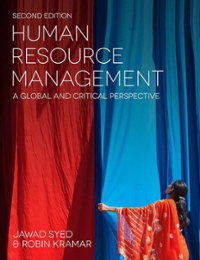Fattal Holding is a regional organisation operating in the Middle East and North Africa region, with a
Question:
Fattal Holding is a regional organisation operating in the Middle East and North Africa region, with a total of 932 employees in Fattal Lebanon, 220 in Syria, 140 in Jordan, 110 in Iraq, 50 in the UAE, and 50 in Sudan. It specialises in distribution, sales, and marketing. The human resources director at Fattal, Mr Samir Messara, has worked there for 24 years, for the last 6 years as human resources director, reporting to the chief operating officer, and previous to that as a line manager.
The human resources department at Fattal has existed since 1982, and has developed from a personnel department in charge of administrative activities to a strategic human resources department that started off in 1996-1997. There are currently seven employees in the human resources department working in the following divisions: personnel administration, training, compensation and benefits, recruitment, and communication and bonding - better known in Fattal as 'the five pillars of human resources', as Mr Messara describes them.
In the past three years, the human resources function has shifted its techniques and adopted a competencybased approach in which all functions (for example, recruitment, selection and performance appraisal) are linked back to core skills and competencies. Mr Messara explained that Fattal's CEO has announced to all the directors that the human resources department is the most strategic asset in the company because it deals with people. Mr Messara asserted that senior management, as well as line management, at Fattal recognise the significance of the human resources function and appreciate its added value, considering it to be as important as the other functions in contributing to the organisation's performance. He also stressed that the operational and strategic pillars are equally important parts of the human resources department: 'operational does not mean that it is not important, and strategic does not mean that it is theoretical'. Subdividing functions into operational and strategic is thus a secondary issue as one without the other does not work or succeed - in other words, there is a 'duality'.
The human resources function therefore plays both a reactive and a proactive role. A reactive role is adopted when a decision is taken and the human resources department 'cascades it' through its systems and procedures; human resources monitors its execution and follows it to completion or finalisation. Human resources operations are now expanding in terms of new people - new assignments and recruitment for human resources in Syria and Iraq - a reactive role in which human resources has been deeply involved.
The proactive role comes from the strategic part of human resources. Human resources is always invited to be part of the 'think-tank' of the company and is invited by the CEO and Director to join in the decision-making about the next steps to be taken. Human resources is involved in the organisation's major business decisions and takes part in strategy-setting meetings wherein HR staff offer their own input. Their input is considered in the final outcome, and the department also maintains open lines of communication with the Chairman, CEO, and all the general managers and country managers.
The proactive role of human resources can therefore be seen to be quite important in Fattal. For example, the firm had an issue regarding whether or not to open a subsidiary in Libya - this would need investment, the country was new to the firm's operations, and it would need new suppliers. Mr Messara explained that the human resources department was involved from day one in discussing the viability, feasibility and implications of opening up in Libya, as well as in how to go about it.
Questions
1 How has the human resources department evolved at Fattal during the last 28 years?
2 Mr Messara stressed that the operational and strategic pillars are equally important parts of the human resources department: 'operational does not mean that it is not important, and strategic does not mean that it is theoretical'. Critically examine this statement and elaborate more on the 'duality' of HRM's role, as well as on factors critical to success.
Step by Step Answer:

Human Resource Management A Global And Critical Perspective
ISBN: 9781137521620
2nd Edition
Authors: Jawad Syed, J; Kramar Syed, Robin Kramar





